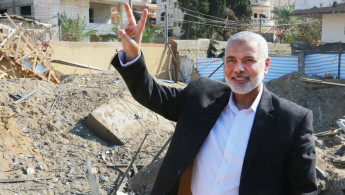Israel must allow for promised development in Gaza for truce to continue: Haniyeh
Two industrial zones, a power line and a hospital will be built in the besieged Gaza Strip, Hamas leader Ismail Haniyeh announced on Thursday.
In a briefing with media, Haniyeh announced the new developments in the besieged enclave are being orchestrated as a part of a truce deal between Hamas and Israel.
Hamas announced the truce, which was brokered by the United Nations, Egypt and Qatar, but Israel has not yet said anything about it as it refuses to directly communicate with the Gaza-based group.
He did not say when construction of the two industrial zones and the hospital would start, but he noted that funds from Qatar would be used to purchase a new power line from Israel and create new jobs.
Last weekend, a Qatari delegation delivered $20 million in cash to Gaza with the aim to kick start the new power line project.
Haniyeh also slammed Israel for refusing to comply with the part of the truce deal by repeatedly reducing the size of the besieged enclave's fishing zone, which was supposed to be widened to 18 nautical miles under the deal.
He accused Israel of breaking with the ceasefire and of delaying the launch of the projects included in the truce deal.
"The truce in danger because of the non-compliance by the occupation to implement the mandatory duties," Haniyeh said.
"We want to provide a dignified life for our Palestinian people and we want to spare our people repeated (Israeli) aggressions," he said.
Israel strictly controls both crossings and has enforced a siege on Gaza since 2007, shortly after Hamas took control of the coastal strip.
UN officials and rights activists have repeatedly called for Israel to lift the blockade against Gaza, citing deteriorating humanitarian conditions.
The coastal enclave suffers from a severe lack of electricity and relies on fuel-powered generators during outages that last hours at a time.
Israel insists its blockade is necessary to isolate Hamas, with which it has fought three wars since 2008, scarring the besieged enclave.
Critics say it amounts to collective punishment of the coastal enclave's two million residents.
The UN says Gaza will be uninhabitable by 2020, but human rights organisations say Gaza has reached inhabitability now.





 Follow the Middle East's top stories in English at The New Arab on Google News
Follow the Middle East's top stories in English at The New Arab on Google News
![Both Hamas and the Palestinian Authority welcomed the ICC arrest warrants [Getty]](/sites/default/files/styles/image_330x185/public/2024-11/GettyImages-2178351173.jpg?h=199d8c1f&itok=TV858iVg)

